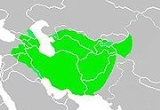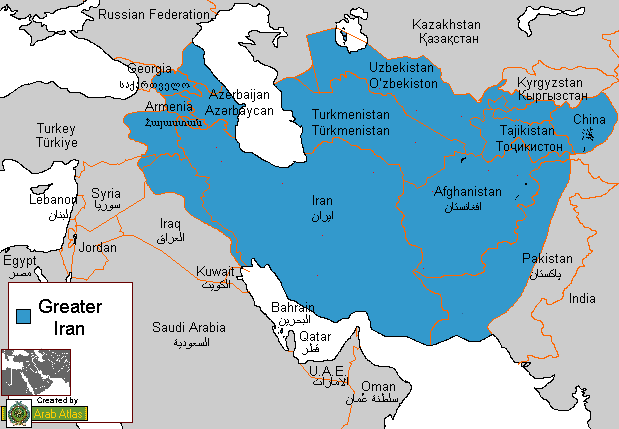
Persian religions
Encyclopedia

Greater Iran
Greater Iran refers to the regions that have significant Iranian cultural influence. It roughly corresponds to the territory on the Iranian plateau and its bordering plains, stretching from Iraq, the Caucasus, and Turkey in the west to the Indus River in the east...
, that is, among speakers of various Iranian languages
Iranian peoples
The Iranian peoples are an Indo-European ethnic-linguistic group, consisting of the speakers of Iranian languages, a major branch of the Indo-European language family, as such forming a branch of Indo-European-speaking peoples...
and hence with an Iranian cultural background. Moreover, Iranians played a significant role in the development and transmission of Judaism
Judaism
Judaism ) is the "religion, philosophy, and way of life" of the Jewish people...
, Christianity
Christianity
Christianity is a monotheistic religion based on the life and teachings of Jesus as presented in canonical gospels and other New Testament writings...
, and Islam
Islam
Islam . The most common are and . : Arabic pronunciation varies regionally. The first vowel ranges from ~~. The second vowel ranges from ~~~...
.
Antiquity
- ZoroastrianismZoroastrianismZoroastrianism is a religion and philosophy based on the teachings of prophet Zoroaster and was formerly among the world's largest religions. It was probably founded some time before the 6th century BCE in Greater Iran.In Zoroastrianism, the Creator Ahura Mazda is all good, and no evil...
- ZurvanismZurvanismZurvanism is a now-extinct branch of Zoroastrianism that had the divinity Zurvan as its First Principle . Zurvanism is also known as Zurvanite Zoroastrianism....
: By late AchaemenidAchaemenid EmpireThe Achaemenid Empire , sometimes known as First Persian Empire and/or Persian Empire, was founded in the 6th century BCE by Cyrus the Great who overthrew the Median confederation...
times, Zoroastrianism was also evident as Zurvanism (Zurvanite Zoroastrianism), a monistMonismMonism is any philosophical view which holds that there is unity in a given field of inquiry. Accordingly, some philosophers may hold that the universe is one rather than dualistic or pluralistic...
dualismDualismDualism denotes a state of two parts. The term 'dualism' was originally coined to denote co-eternal binary opposition, a meaning that is preserved in metaphysical and philosophical duality discourse but has been diluted in general or common usages. Dualism can refer to moral dualism, Dualism (from...
that had a following as late as the Sassanid era. - MandaeismMandaeismMandaeism or Mandaeanism is a Gnostic religion with a strongly dualistic worldview. Its adherents, the Mandaeans, revere Adam, Abel, Seth, Enosh, Noah, Shem, Aram and especially John the Baptist...
: A gnostic monotheism of (at the latest) the 1st century CE observed Mandā d-Heyyi - "Knowledge of Life". Mandaean theology is based more on a common heritage than on any set of religious creeds and doctrines. - ManichaeismManichaeismManichaeism in Modern Persian Āyin e Māni; ) was one of the major Iranian Gnostic religions, originating in Sassanid Persia.Although most of the original writings of the founding prophet Mani have been lost, numerous translations and fragmentary texts have survived...
: 3rd century ditheistic gnosticism that may have been influenced by Mandaeism. Manichaens believed in a "Father of Greatness" (Aramaic: , Persian: pīd ī wuzurgīh) and observed Him to be the highest deity (of light). - Mazdakism: A late 5th/early 6th century proto-socialist gnosticism that sought to do away with private property.
Medieval period
- The early Islamic period saw the development of Persian mysticismPersian mysticismPersian mysticism, or the Persian love tradition, is a traditional interpretation of existence, life and love in Iran. It relies on revelatory and heart-felt principles in its reasoning...
, a traditional interpretation of existence, life and love with Perso-Islamic SufiSufismSufism or ' is defined by its adherents as the inner, mystical dimension of Islam. A practitioner of this tradition is generally known as a '...
monotheism as its practical aspect. This development believed in a direct perception of spiritual truth (God), through mystic practices based on divine love.
- KhurramitesKhurramitesThe Khurramites were an Iranian religious and political movement with its roots in the movement founded by Mazdak. An alternative name for the movement is the Muḥammira "Red-Wearing Ones" , a reference to their symbolic red dress.-Origins and History:The sect was founded by the Persian cleric...
, a 9th century religious and political movement based on the 8th century teachings of SunpadhSunpadhSunpadh or Sinbad or Sinbad the Magus was a Persian cleric from a small village called Āhan near Nishapur who incited an uprising against the Abbasid Caliphate in the 8th century....
, who preached a syncretism of Shia Islam and Zoroastrianism. Under Babak KhorramdinBabak KhorramdinBābak Khorram-Din was one of the main Persian revolutionary leaders of the Iranian Khorram-Dinān , which was a local freedom movement fighting the Abbasid Caliphate. Khorramdin appears to be a compound analogous to dorustdin and Behdin "Good Religion" , and are considered an offshoot of...
, the movement sought the redistribution of private wealth and the abolition of Islam. - Behafaridians, an 8th century cult movement around the self-acclaimed prophet Behafarid. Although the movement is considered to have its roots in Zoroastrianism, Behafarid and his followers were executed on charges (made by Zoroastrians) of harm to both Zoroastrianism and Islam.
- Yarsan, a religious order of YazdanismYazdânismYazdânism is a neologism introduced by Mehrdad Izady in 1992 to denote a group of native Kurdish monotheistic religions: Alevism, Yarsan and Yazidism....
, which is believed to have been founded in the 16th century. Yazdanism promulgated the belief in a God manifest as one primary and five secondary avatars to form with God the Holy Seven.
Modern
- Bábísm, a mid-19th century monotheistic religion founded by the BábBábSiyyid `Alí Muḥammad Shírází was the founder of Bábism, and one of three central figures of the Bahá'í Faith. He was a merchant from Shíráz, Persia, who at the age of twenty-four claimed to be the promised Qá'im . After his declaration he took the title of Báb meaning "Gate"...
that was a predecessor of the Bahá'í FaithBahá'í FaithThe Bahá'í Faith is a monotheistic religion founded by Bahá'u'lláh in 19th-century Persia, emphasizing the spiritual unity of all humankind. There are an estimated five to six million Bahá'ís around the world in more than 200 countries and territories....
. - Bahá'í FaithBahá'í FaithThe Bahá'í Faith is a monotheistic religion founded by Bahá'u'lláh in 19th-century Persia, emphasizing the spiritual unity of all humankind. There are an estimated five to six million Bahá'ís around the world in more than 200 countries and territories....
, an emerging monotheistic religion founded by Bahá'u'lláhBahá'u'lláhBahá'u'lláh , born ' , was the founder of the Bahá'í Faith. He claimed to be the prophetic fulfilment of Bábism, a 19th-century outgrowth of Shí‘ism, but in a broader sense claimed to be a messenger from God referring to the fulfilment of the eschatological expectations of Islam, Christianity, and...
, a 19th century Persian exile.

